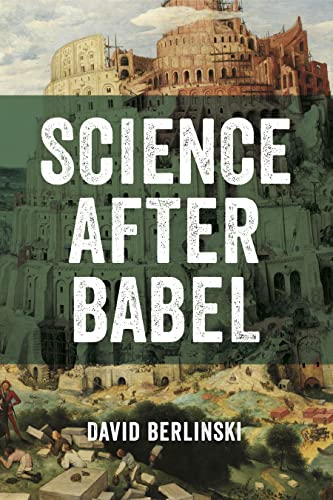David Berlinski har nettopp kommet ut med en ny bok med et kritisk blitt på vitenskapen. Berlinski er en matematiker og filosof med PhD i filosofi fra Princeton University. Han har også arbeidet innenfor mikrobiologi og undervist ved Stanford University og en rekke andre kjente universitet, og er «senior fellow» ved Discovery Institute. I sin nye bok utfordrer han oss til å tenke over: Hvor tar dagens vitenskap feil?
Om boken
Berlinski, som har reflektert rundt vitenskapens rolle og historie i flere tiår, ser på vitenskapen som imponerende. Samtidig ligner dagens vitenskap på mange måter Babels tårn.
Når vi ser på tårnet blir vi beveget til å se opp til dets store størrelse, men vi er også bundet til å erkjenne dets svakheter.
David Berlinski
«Tårnet er fortsatt her», skriver Berlinski. «Faktisk er det større enn noen gang. Men det har ikke nådd himmelen eller forlatt bakken.» Hvilke feil og mangler har dette tårnet vi kaller «vitenskap»? Berlinski er innom kjente vitenskapspersonligheter som Charles Darwin og John Newton samtidig som han takler etablerte filosofier som preger dagens vitenskap, som materialisme og scientisme.
Hva andre sier om «Science After Babel»
Fra baksiden av boken:
«If I were picking two books to be required reading for every college student in the United States, Science After Babel would be one. A striking and beautiful and absolutely necessary book. David Berlinski at his spectacular best.»
–David Gelernter, Professor of Computer Science, Yale University
«Whether deconstructing the latest theory of everything or dishing on scientists and mathematicians he has known, whatever David Berlinski writes is delightful and profitable to read!»
–Michael Behe, Professor of Biological Sciences, Lehigh University, author of Darwin’s Black Box, The Edge of Evolution, and Darwin Devolves
«Science After Babel is a literary triumph. In it, David Berlinski masterfully exposes the hubris of scientific pretensions with a wit that dances deftly between the lines, unveiling profound insights with a refreshing candor. This book testifies to the author’s penetrating intellect, inviting readers to reconsider the limits of scientific authority and reject facile invocations of science that demand assent at the expense of compelling evidence and rigorous thought.»
–William Dembski, mathematician, philosopher, and former head of the Michael Polanyi Center at Baylor University; author of multiple groundbreaking works on the theory of intelligent design, including The Design Inference (Cambridge University Press, 1998)
«Berlinski speaks wittingly as an insider to the sciences and their recent history. As a historian-philosopher of science, I recognize numerous valuable insights in this collection of arguments and memories. He captures the wonder of scientific inquiry without misplaced worship of speculative pronouncements made in its name. Berlinski is the most enjoyable antidote to scientism I know.»
–Michael Keas, Lecturer in the History and Philosophy of Science, Biola University, author of Unbelievable: 7 Myths About the History and Future of Science and Religion
«David Berlinski is world class at combining devastating wit with even more devastating substantive criticism, and this book would be well worth its purchase price for the fine polemic essays it contains. But what makes it really special is the inclusion of hard-to-find historical and technical essays on mathematics, biology, and philosophy. In his popular writing, Berlinski has generally refrained from delving into all the gory details of his arguments, though we can sense a mastery of those details. Here the mastery is on unrestrained display, and the details can be fully enjoyed.»
–Stephen McKeown, Assistant Professor of Mathematics, University of Texas at Dallas

